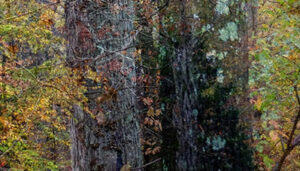The Strawberries and Something about Love
Before we were grown, we called everything hunting:
when we trudged through pastures for the mares at night
because in summer, they never came in on their own;
when we searched for the barn cat who only wanted
to be loved sometimes and was usually lounging
in the hay mow or the tractor seat, stretching on her back,
one paw extended to the thrushes nestled in the trusses;
or when we’d sneak chocolate candy from the bowl
only I could reach before we knew her face and neck
would splotch and swell. But mostly it was while our uncles
hunted turkey, we crawled amongst tree trunks for wild strawberries.
Our fingers stained pink and sticky, noses near dirt, palms flattening
groundsel leaves so the fruit was easier to reach, we’d slip
blue vervain and eyebright into each other’s hair, tie the long stems
of black-eyed-susans through our belt loops. Sunrays cut
through budding branches like spotlights, shimmered with dust
and cottonwood seeds. The fruit, barely wider than our fingertips,
had a bite so sweet it made our jaws clench. She’d ask me
what’s wrong with mom and dad, to explain what love should be,
since she’s never seen it. A cardinal chimed after a distant gunshot
as a reminder this place is beautiful but not always safe
and I think of all the reasons that were never reasons for us to be told
we still weren’t enough, how a shaking beer can, and slurred words carve
the hearts of young girls and turn them to stone. I’d distract her
with a troop of morels because how could I know about something
I’d only ever seen in broken form? Instead, we continued our hunt
for strawberries until the men returned with their gloves and truck beds
bloody. Dad was never with them, but we always waited,
hunting for the sound of tires crushing gravel, the clap
of a Marlboro pack against his thigh, and steel-toes shuffling
home. Nowadays, it feels like we’re only hunting
for time—like we’ve forgotten what it was like to only have
each other and the fruit and the sun. When I visit her now,
it’s always brief, riddled with a past neither of us want
to talk about or address. We meet in the barn, tack up the mares
and ride down the road to a tree farm where we hide out until
we remember how slowly dark settles here, in quiet ripples
stretching over each branch and needle, shuttering like a cat’s
wide yawn before her teeth click closed. My sister asks for one
of my old stories, the ones I’d tell when we were young, of fantasy,
turning our trail rides into a quest with our noble mares. Pretending
to be chased, we race each other down pine rows, some of them barely
taller than our horses’ backs, resting only in the furthest corner
of the field—rabbits and turkeys scattering as we approach.
I ask her how she’s been, still living with dad
since I’ve left. She tells me about the fights all too familiar,
about his late nights, about how she still doesn’t know
what to do with it all. We talk about love like we know
what it means now even though we’re still guessing,
assuming dad means well, that it’s all because of a disease.
She clicks her tongue for her mare’s grazing head
to rise from a sea of coneflower and lace
and we trot off over the creek bed, past the apple-thorns,
and through the birch trees, around the wild strawberry patch
we are always careful not to bury in hoofprints—hunting
again, for the bright eye of a lit cigarette in the dark,
for the hardest path home.
When the Sky Opens
Papa says we won’t be planting corn anymore, says he wants to see the deer file from the trees like fish from an open hand offering them back to the lake, wants to see the sun fill the field like a bowl. He leans against the barn, presses a blistered thumb between his knuckles, the thin and sun-weathered skin turning white. I want to remind him he’ll see the deer after harvest, that there’s still time, but I know the story of when this land was covered in blood—a red funnel cloud tearing through forest and swamp, lifting only when it hovered over us, this field. Perhaps he knows we can only be spared once. Baptized in crimson rain, the wheat bowed in red beads, the sheets, quiet on the line, smeared and stained. A neighbor thought coyotes had attacked their herd again, cursing the boy who slept while watching them graze, red grass staining their lips and hides. One field for another. A village convinced of the divine—a newspaper clipping reveals the blood tasted sweet as the funnel having twisted through raspberry patch and cranberry marsh. Papa kneels, each joint clicking, plucks a wild strawberry from near my boot and tosses it into his mouth. His eyes still on the wide flat of the field, afraid to look away from the sun-tipped trees. I wait for the sky to open. For the mammatus clouds hanging above us to break and loosen the darkened magnolia blooms drooping like inkblots from their thin branches. For another storm to whisk them up and cover some other field in ash or snow.
